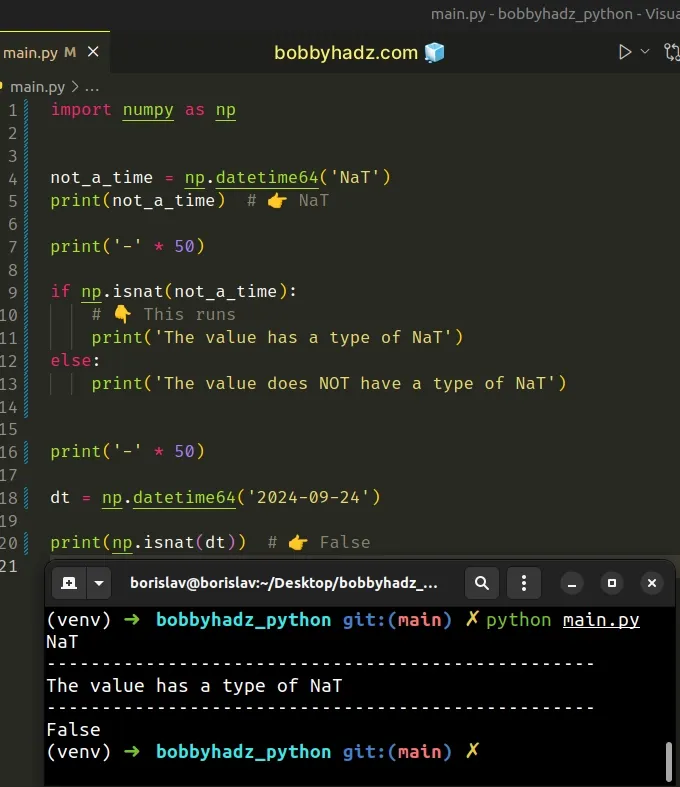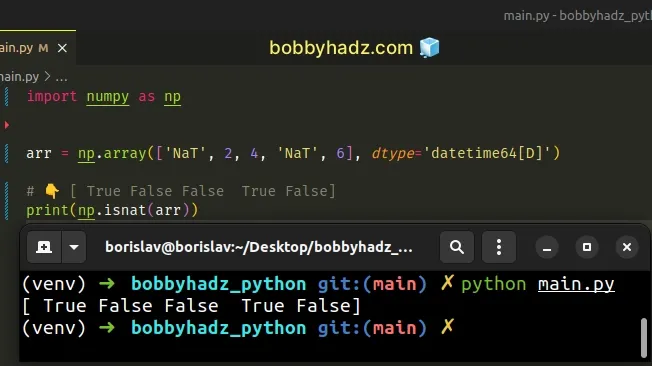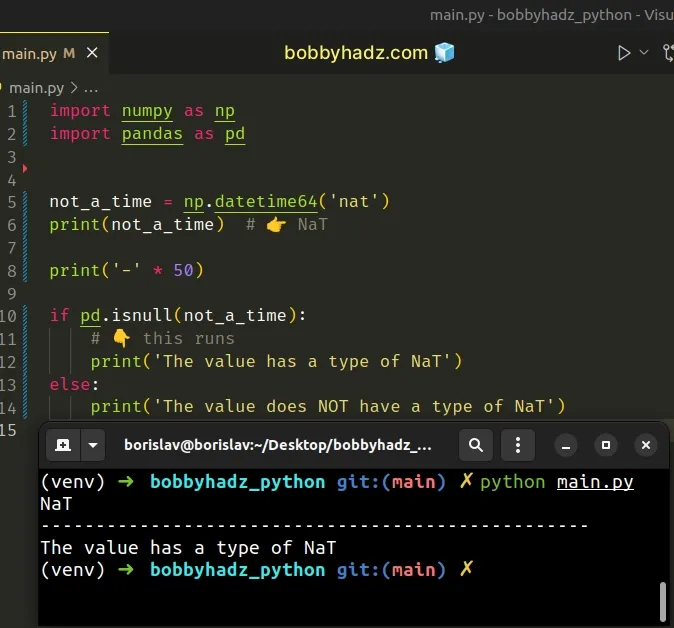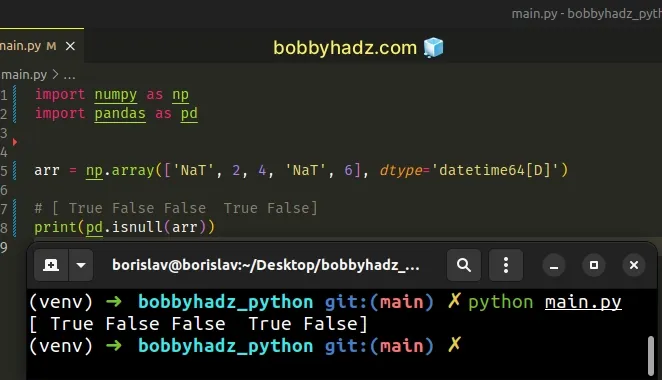NumPy or Pandas: How to check a Value or an Array for NaT
Last updated: Apr 12, 2024
Reading time·4 min

# Table of Contents
- NumPy: How to check a Value or an Array for NaT
- Checking a Value or an Array for NaT with
pandas.isnull() - Checking a value for NaT by converting it to a string
# NumPy: How to check a Value or an Array for NaT
You can use the numpy.isnat() method to check a value or an array for
NaT.
The isnat() method returns True if the value is NaT and False
otherwise.
import numpy as np not_a_time = np.datetime64('NaT') print(not_a_time) # 👉️ NaT print('-' * 50) if np.isnat(not_a_time): # 👇️ This runs print('The value has a type of NaT') else: print('The value does NOT have a type of NaT') print('-' * 50) dt = np.datetime64('2024-09-24') print(np.isnat(dt)) # 👉️ False

The code sample uses the numpy.isnat() method to check if a single value is
NaT (not a time).
The method will return True if the value is NaT and False otherwise.
The same approach can be used to check if each value in an array is NaT.
import numpy as np arr = np.array(['NaT', 2, 4, 'NaT', 6], dtype='datetime64[D]') # 👇️ [ True False False True False] print(np.isnat(arr))

We directly passed the array to the numpy.nat() method.
The method returns True if the element is NaT and False otherwise.
Note that the numpy.isnat() method fails when checking for Pandas NaT.
import numpy as np import pandas as pd # ⛔️ TypeError: ufunc 'isnat' is only defined for datetime and timedelta. print(np.isnat(pd.NaT))
If you need to be able to check for both pandas and NumPy NaT, use the
pandas.isnull() method from the next subheading.
# Checking a Value or an Array for NaT with pandas.isnull()
You can also use the
pandas.isnull
method to check a value or an array for NaT.
Make sure you have the pandas module installed to be able to run the code sample.
pip install numpy pandas # or with pip3 pip3 install numpy pandas
Now import the module and use the pandas.isnull() method.
import numpy as np import pandas as pd not_a_time = np.datetime64('nat') print(not_a_time) # 👉️ NaT print('-' * 50) if pd.isnull(not_a_time): # 👇️ this runs print('The value has a type of NaT') else: print('The value does NOT have a type of NaT')

The pandas.isnull() method takes a scalar or an array-like object and
indicates whether the values are missing:
NaNin numeric arrays.NoneorNaNin object arrays.NaT(not a time) indatetimeobjects.
You can also use the method to check an array for NaT values.
import numpy as np import pandas as pd arr = np.array(['NaT', 2, 4, 'NaT', 6], dtype='datetime64[D]') # 👇️ [ True False False True False] print(pd.isnull(arr))

A True value is returned for each array element that is NaT, otherwise,
False is returned.
The pandas.isnull() method properly checks for both NumPy and Pandas NaT
values, so it should be your preferred approach.
import numpy as np import pandas as pd print(pd.isnull(pd.NaT)) # 👉️ True print(pd.isnull(np.datetime64('nat'))) # 👉️ True
You might also see the pandas.isna() method being used.
import numpy as np import pandas as pd print(pd.isna(pd.NaT)) # 👉️ True print(pd.isna(np.datetime64('nat'))) # 👉️ True
The pandas.isna() method is just an alias for pandas.isnull().
# Checking a value for NaT by converting it to a string
You can also check a value for NaT by converting it to a string.
import numpy as np not_a_time = np.datetime64('nat') print(not_a_time) # 👉️ NaT print('-' * 50) if str(not_a_time) == 'NaT': # 👇️ this runs print('The value has a type of NaT') else: print('The value does NOT have a type of NaT')
Converting a datetime object with a type of NaT to a string returns the
string "NaT".
import numpy as np not_a_time = np.datetime64('nat') print(not_a_time) # 👉️ NaT print(repr(str(not_a_time))) # 👉️ 'NaT'
Therefore, we can compare the resulting string to "NaT".
import numpy as np not_a_time = np.datetime64('nat') print(not_a_time) # 👉️ NaT print(str(not_a_time) == 'NaT') # 👉️ True dt = np.datetime64('2024-09-24') print(str(dt) == 'NaT') # 👉️ False
The expression returns True if the value has a type of NaT and False
otherwise.
However, note that this approach can only be used to check if a single value is
NaT.
If you need to check if each value in an array is NaT, use the approach from
the previous subheading.
# Additional Resources
You can learn more about the related topics by checking out the following tutorials:
- OverflowError: Python int too large to convert to C long
- TypeError: Field elements must be 2- or 3-tuples, got 1
- ValueError: Expected 2D array, got 1D array instead [Fixed]
- TypeError: ufunc 'isnan' not supported for the input types
- Convert a Row to a Column Header in a Pandas DataFrame
- Arrays used as indices must be of integer (or boolean) type
- Get the column names of a NumPy ndarray in Python
- ValueError: No axis named X for object type DataFrame
- Calculate the average (mean) of 2 NumPy arrays
- Interpolating NaN values in a NumPy Array in Python
- Reading specific columns from an Excel File in Pandas
- NumPy: Calculate the distance between a Point and a Line
- Only valid with DatetimeIndex, TimedeltaIndex or PeriodIndex, but got an instance of X
- Get N random Rows from a NumPy Array in Python
- Create Date column from Year, Month and Day in Pandas
- Remove the Duplicate elements from a NumPy Array
- NumPy: Apply a Mask from one Array to another Array
- How to iterate over the Columns of a NumPy Array
- Pandas: Find an element's Index in Series [7 Ways]
- All the input arrays must have same number of dimensions
- Only integer scalar arrays can be converted to a scalar index
- ValueError: Index contains duplicate entries, cannot reshape
- TypeError: type numpy.ndarray doesn't define __round__ method

